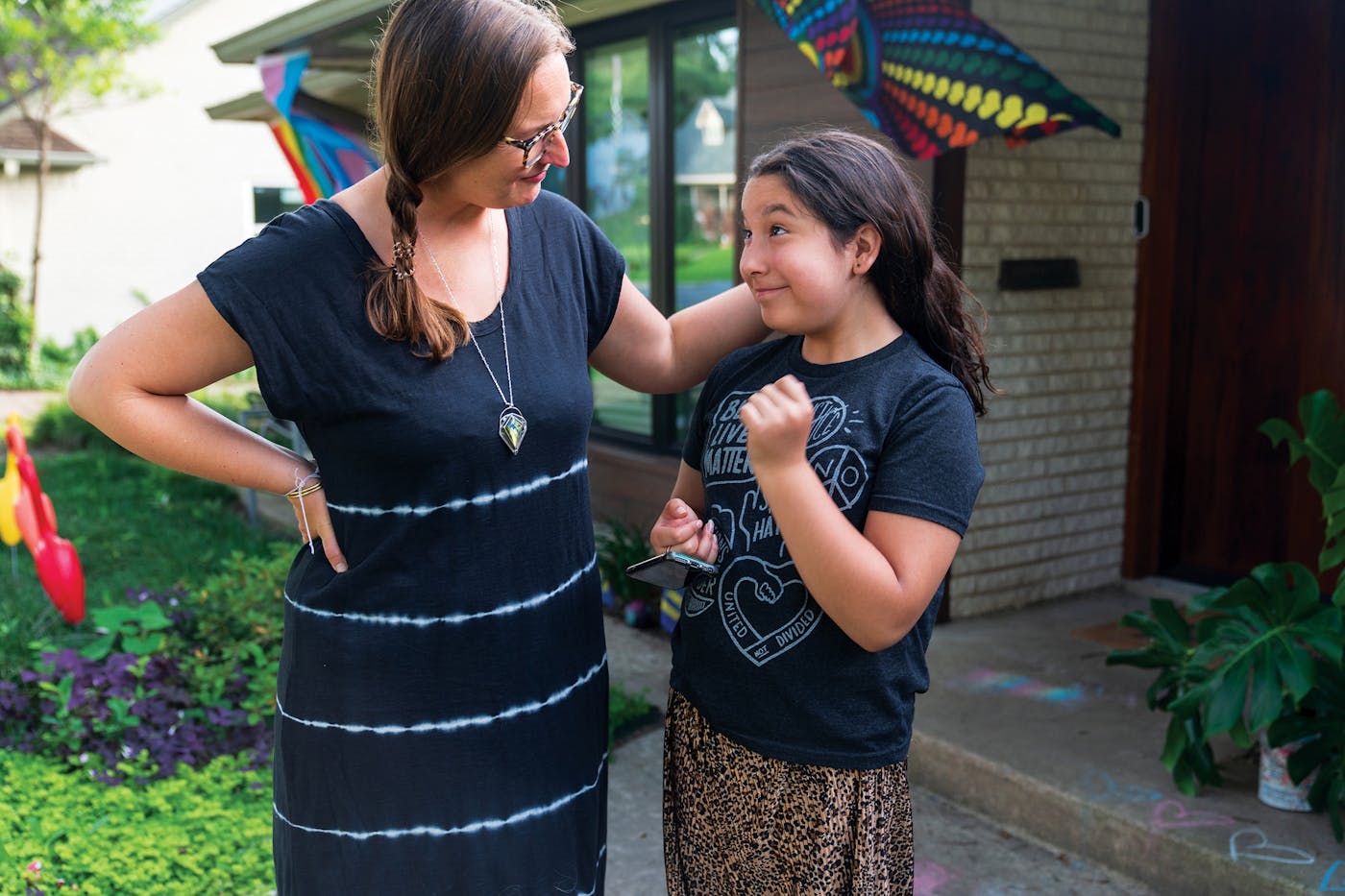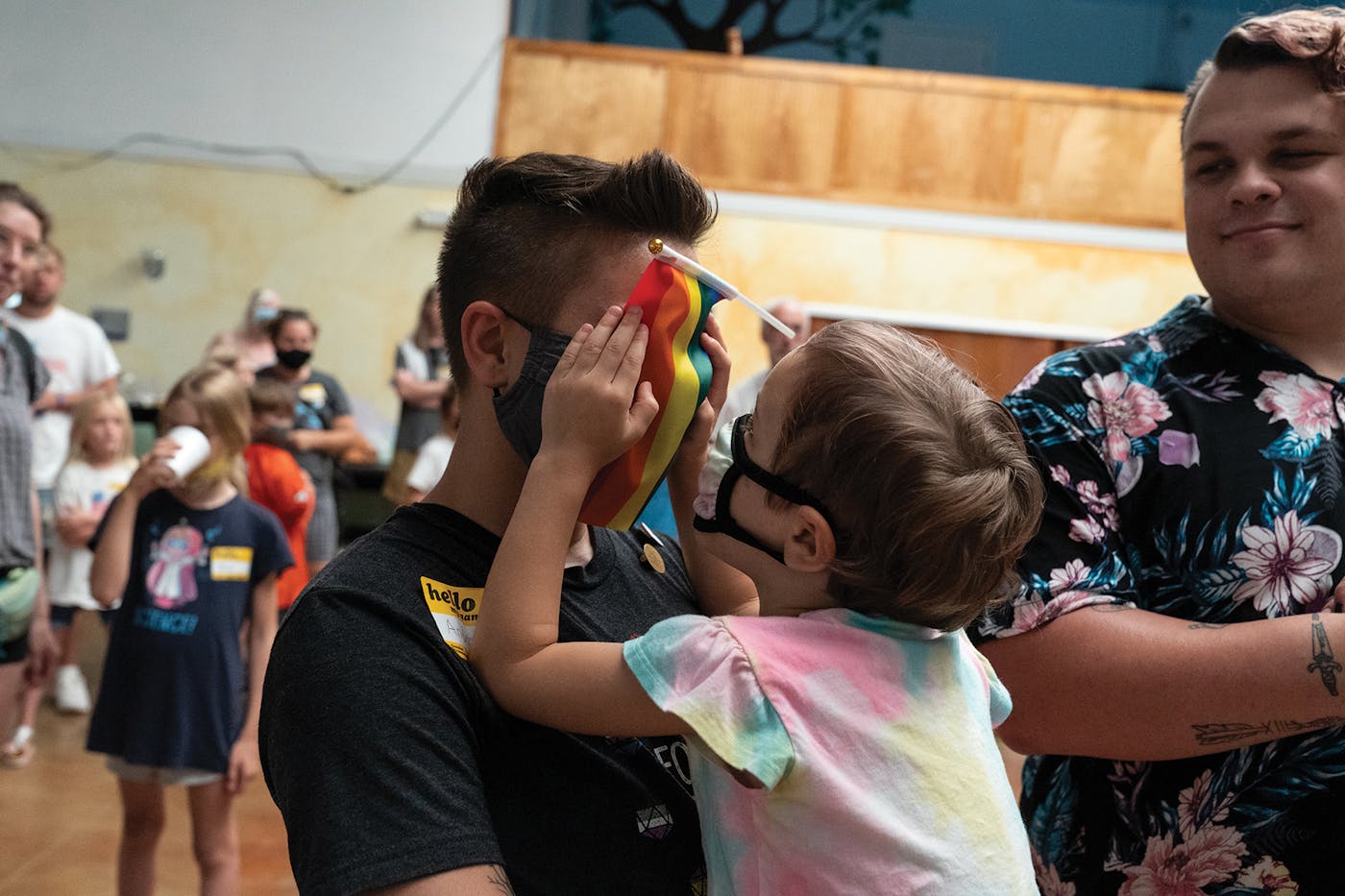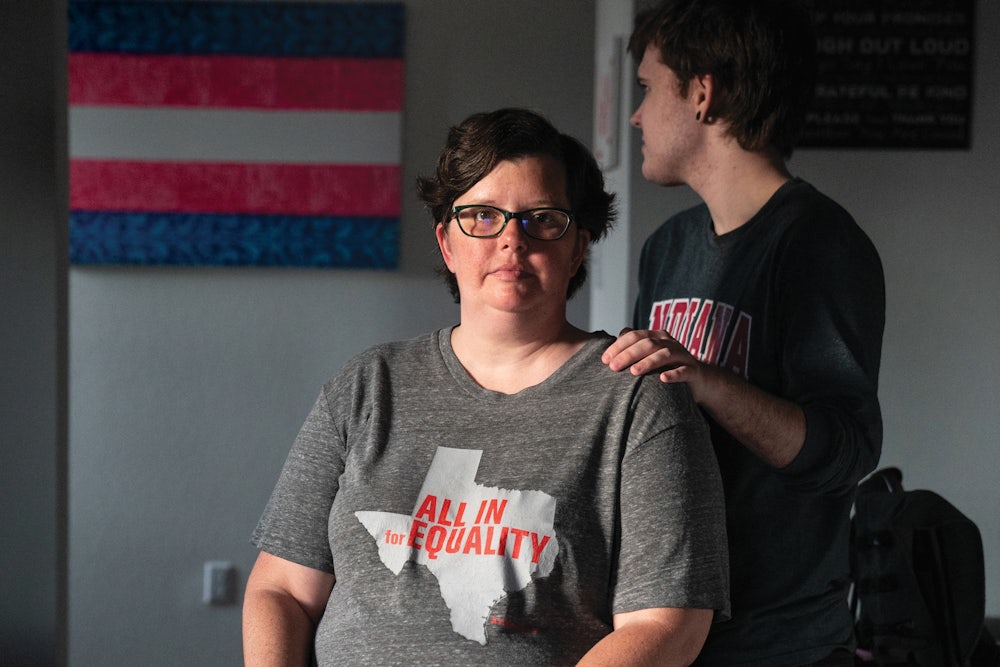This spring, when Libby Gonzales arrived in Austin, Texas, with her mother, Rachel, and her little sister,
Cecilia, she was already a veteran of the state’s legislative sessions; this would be her third. The first time,
she testified against laws meant to ban her from girls’ bathrooms in school. Now she was facing bills to block
her access to lifesaving health care and to criminalize her medical providers and her parents. Libby is 11.
Since 2017, successive legislative sessions have brought more anti-trans bills, more long drives from Dallas, and more hours spent waiting to get “your two minutes to tell your legislators why they’re wrong,” as Rachel put it when we later met at the Capitol. Exhausted, she was taking a break on a bench in the basement, her blonde hair falling around multiple necklaces set with semiprecious stones. On her sweater, she wore a trans pride flag and a Texas pin. It was clear how proud she was of her trans daughter for finding her voice, and how angry she was at the circumstances that had led Libby—and the rest of her family—into the political spotlight. While we talked, Rachel twisted a gold ring around her finger, revealing cursive script crowned with a rose: FUCK OFF.
This year, more than 110 anti-trans bills have been introduced in state legislatures across the country, the biggest wave of anti-trans legislation in U.S. history. As of this publication, at least 13 have been adopted into law. Trans people in Texas faced the most attacks: During the 2021 regular legislative session, Texas Republicans proposed some 13 anti-trans measures, more than any other state. Nearly half of those were school sports bills, which aim to restrict the teams trans kids are allowed to join. Texas is not alone in its emphasis on sports; according to reporting by USA Today, at least 36 states introduced more than 70 such bills.
Republican lawmakers’ proposals in Texas were also some of the most extreme in the nation. One bill barred people under the age of 18 from being prescribed hormone replacement therapy or receiving any other transition-related care, such as puberty blockers (with some exceptions for intersex youth); another defined parents or others who helped trans kids access those forms of health care as child abusers. The sheer volume and severity of the proposed legislation were enough to cause some parents of trans kids, including Rachel Gonzales, to seriously consider leaving the state. “We wouldn’t have a choice,” Rachel told me. “If my husband and I were going to be criminalized and we were facing the potential of our daughter being removed from our house, we would be gone the next day.”
Republicans across the United States have seized on trans people as a social and political scapegoat, reprising a strategy used to great effect in Texas late in the Obama administration. This strategy bears some surface resemblance to Republican attacks on marriage equality the decade before, when the GOP succeeded in getting voters to back dozens of ballot initiatives limiting marriage to one man and one woman, while also securing votes for Republicans (though it’s unclear whether it was as decisive a factor as many contemporary commentators claimed). But the fight for marriage equality started in the lesbian and gay rights movement. There is at present no analogous fight for trans rights backed with anything resembling the same level of legal, philanthropic, or political muscle. Indeed, in the conflict over marriage equality, trans rights were pushed to the political margins, a dynamic that set the stage for the current war on trans people.
Cannily, the right has exploited the marginalization of trans rights, not just within LGBTQ rights’ groups, but also within progressive groups and the Democratic Party. “We need to be as big a priority amongst our friends as we are amongst our enemies,” said Gillian Branstetter, a spokesperson for the National Women’s Law Center. Yet decades of trans exclusion have hamstrung the fight against these anti-trans bills—which, even when they fail, as most have, still do significant damage by reinforcing the anti-trans stigma that got us here in the first place. Those showing up to push back on these bills are now living with that damage. They may also know, from the experience, how to stop this before it escalates any further.

Rachel Gonzales’s family first spoke out against anti-trans legislation at the Texas state Capitol in 2017, when
Republican legislators introduced the infamous “bathroom bill,” SB 6, which would have banned trans
people from using public bathrooms, through discriminatory regulations targeting public schools, universities,
and government buildings. That bill ultimately died, first in the regular legislative session and again in a
special session when Governor Greg Abbott made SB 6 a priority. In a way, Rachel thought, organizers’ victory
over previous anti-trans legislation had led to this fight. “Parents were so effective in shutting down
the bathroom bill,” she told me. And that very success is why they’re coming after parents now. Rachel has
worked with Equality Texas, a state-based LGBTQ rights group that has been helping coordinate testimony against
the bills, tapping the informal networks of families with trans kids across Texas. When she testified with her
daughters this session, she said, “it was the most violent experience we’ve ever had at the
Capitol.”
On one of those days, April 14, Libby spent most of her time with other trans kids, hanging out in the underground levels of the massive Capitol complex, where supportive legislators had reserved space for them away from the fray. The kids had plenty of snacks, and in the basement they could make signs and talk without being shushed. Some practiced what they would say in their testimony, whenever the time came. A few levels up, in the Capitol rotunda lined with painted portraits of the state’s governors, the scene was different. There, anti-trans activists tried to disrupt a trans rights rally the kids took part in. “They’re screaming that we’re child abusers,” Rachel said, “that we were dismembering children, that we’re mutilating children.” Sometimes, the harassers shot video of the kids. “These,” she pointed out, “are the people calling us child abusers.”
One of the mothers who told me this story was Lauren Rodriguez, a social worker who lives in Austin with her
17-year-old son, Greyson. He had come out to his mom about being trans a few years before; if these bills had
been law back then, Lauren said, she wasn’t sure her son would still be alive. Like Rachel, she approached the
dire stakes with a gentle dose of levity. “I may as well move into the Capitol,” she once told me
with a laugh.
In the Capitol basement, Lauren saw a man begin following Greyson on his way to the bathroom, with a phone in hand, recording and demanding, “What bathroom are you going to use, tranny?” She confronted him, took his phone, and deleted the photos while he protested. When security came, Lauren recalled, “the cops were like, ‘Sir, how many times have we had to tell you?’” After that, she and the other moms started cautioning people to make sure their kids locked the main bathroom door.
The bill that drew the anti-trans activists out that day was HB 1399, introduced by state Representative Matt Krause. It proposed to block minors’ access to transition-related care by penalizing their health care providers. In support of the legislation, witnesses turned to familiar arguments undermining the truth of trans kids’ lives, suggesting that such children aren’t really trans, that they have been unduly influenced by “social contagion” and encouraged by over-accommodating parents. The testimony was an opportunity to further spread misinformation and the stigma against trans kids, and opponents tried their best to counter the flood of lies. Adri Perez, a policy and advocacy strategist for the ACLU of Texas, testified that they knew who they were at four years old, even when adults did not respect them. “I hope that today is the day that we stop bullying all the transgender kids and teens,” Perez said. Those kids “know better than anyone how to stand in their truth.”
As HB 1399 was before the state House health committee, the state Senate took up SB 1646, a bill that would allow parents of trans kids to be charged with child abuse. Supporters of bills like these typically advanced a very pointed narrative: that a powerful, shadowy “trans lobby,” in concert with the media and Big Pharma, was colluding to sexually exploit—even “mutilate”—children by forcibly “transing” them. If the narrative evokes shades of QAnon, you’re not wrong; Texas Values Action, an organization promoting HB 1399, prompted people to join it using the same hashtag QAnon appropriated, #SaveTheChildren. But this conspiracy theory about trans kids predates QAnon’s specific mix of child sex trafficking panic, and, in fact, the “transing” story now flourishes across the far right. It capitalizes on an existing suspicion about the parents of trans children, one that is hardly harbored exclusively on the right, and on an ongoing attempt to intimidate and control them.
“My Mother’s Day lunch was interrupted by Child Protective Services telling me ‘I’m at your house,’” Lauren recalled. At the time, she was in the middle of a custody fight with Greyson’s father. She had been supportive of her son, who, when he came out to her at 13, had already researched puberty blockers on his own and wanted her affirmation. “It’s not like he came out and then like two days later, top surgery,” Lauren explained. Getting the puberty blockers took six months, she said: There were bone density tests and x-rays and blood work; they had to wait for a referral for the endocrinologist. When he was 15, they went through a similar process to get testosterone. “If you told me when he first transitioned that he would have had any surgery before 18, I would have told you, absolutely not,” she said. “But as we’ve gone, I’ve learned.” With Grey about to head to college, Lauren supported his getting top surgery. She said it was important for him to get to start a new phase of his life having had those medical interventions already, to show up as “just Grey,” to choose if and how he wanted to come out.
One of the things Lauren learned from other moms of trans kids just coming out was that people could call Child
Protective Services and accuse you of being an unfit parent simply because your kid was trans. “We have
what we call a safe folder,” she told me, with “letters from therapists, doctors, friends,
families.” Essentially, the folder was a compilation of character references in case of an emergency like
the one that Mother’s Day. “When CPS shows up at your house because some random bigot decides to call,
then you have this file.” In this case, the caller was not random. Her ex-husband was using Greyson’s
being trans as a way to fight Lauren for custody. By that point, Greyson’s father had rejected Greyson’s
identity. More than wanting Greyson, Lauren explained, his father wanted him to stop being Greyson.

As happens with so many far-right conspiracy theories, the idea that parents are “transing” their children has moved from the fringe into more respectable-seeming venues. Along the way, a Texas father named Jeffrey Younger, who claims his ex-wife forced their daughter Luna into being a girl, has transformed himself into a kind of right-wing folk hero. Younger took his updated men’s rights activist bit from Facebook to One America News, using his daughter’s birth name and broadcasting old photos of her, even after a judge ordered him not to. Younger’s playing the victim—and painting his wife as an abuser—have been an asset, helping him raise more than $100,000 in donations since 2018. He is now the face of a campaign demanding laws to “save” children like his from their supportive parents.
“I just kinda feel like Jeffrey Younger is my ex-husband, but he somehow got a voice,” Lauren said. Younger, who called transition-related care “child abuse and the sexual mutilation of children,” has enjoyed support from Donald Trump Jr., Senators Ted Cruz and Rand Paul, and Texas Governor Abbott—who said in 2019 that the state’s child welfare agency was looking into the case. Texas Republicans shared Younger’s story during floor debate at the legislature, effectively making misinformation about Luna’s transition part of the public record. The proposed Texas child abuse law would give Lauren’s ex-husband more power and control over Lauren and Greyson. The mere fact that she had supported his getting puberty blockers or hormones or surgery could be considered “proof” of abuse, and could lead to loss of custody. The law could empower other people like Younger, angry at the choices their family members have made, to report anyone with a trans child they wanted investigated and possibly removed.
Along with Younger, there were activists like Kevin Whitt, the man who Lauren says had stalked and recorded Grey at the Capitol. In a few terrifying ways, Whitt embodies the condition of the Texas Republican Party: A former Texas GOP field organizer, he staged “White Lives Matter” and anti–Covid restriction rallies, and lost his job with the state party after he was caught on video on January 6, near the U.S. Capitol. (Whitt also praised the Proud Boys and promoted the Pizzagate conspiracy theory on social media.) The convergence between anti-trans activism and the far right is not new, but since the insurrection, researchers have been giving it more attention. The International Centre for the Study of Radicalisation cites the Younger case specifically as an example of an “important narrative that has gained significant traction within the far right,” namely that “transness poses a particular threat towards young children.”
Late in the night, when kids who had been at the Capitol for hours at last got to testify against the bill, some of them weren’t tall enough to bend the microphone on the podium toward themselves. Libby didn’t get that chance: The committee cut off testimony at midnight. Rachel was incensed. “To spend 17 hours at the Capitol and getting heckled and photographed,” she fumed, “and then not be allowed to testify? That’s a pretty rough thing as an adult to deal with, but really rough as an 11-year-old.” Libby hasn’t gone back since. “She’s just been like, why do they care about us?”
After the altercation with Whitt, after testimony had been cut off, Lauren went home and cried for hours. Like
Libby, Greyson had also been denied the chance to speak. Lauren’s crying woke her husband up, and he asked,
“Why are you doing this to yourself?” Lauren didn’t have an answer. The bills kept advancing; she
kept feeling as if she was failing. It was “like being with an abusive partner,” she said.
“But your abusive partner is the flipping state you live in.”
Republicans’ seizure of the Jeffrey Younger case was a sign of things to come, Gillian Branstetter of the National Women’s Law Center told me; it was clear they were making trans children a political priority. The right’s goal of creating legal precedents against trans rights overlaps with its goal of establishing religious exemptions to LGBTQ rights more broadly, and its goal of chipping away at Roe v. Wade state by state: As Branstetter put it, it’s all part of “the larger and more frightening project of legislating extremely strict gender roles into law.” But it can be hard to focus on that when engaged in the day-to-day struggle to combat anti-trans bill after anti-trans bill.
You can see these goals laid out in “Promise to America’s Children,” a shared policy agenda first reported on by Heron Greenesmith at Political Research Associates in February 2021. The bills in Texas and across the country may trace their lineage directly to this “promise,” supported by the Alliance Defending Freedom, the Koch-funded Heritage Foundation, and the Family Policy Alliance, among other groups. The agenda laid out many of the same priorities as those found in the anti-trans bills, from preventing trans girls’ participation in sports to outlawing puberty blockers, along with opposition to LGBTQ and women’s rights: “To protect children,” it promises, from “a culture—and sadly, a government” that want to “sexualize children for the sake of a political agenda.”
Why now, though, especially when it appears to many progressives that support for trans people is on the rise, within the Biden administration and elsewhere? This year is the first full legislative session after the U.S. Supreme Court’s Bostock decision on anti-LGBTQ discrimination in employment, which affirmed that freedom from discrimination based on sexual orientation and gender identity should be understood as part of the broader category of discrimination that is prohibited on the basis of sex. Alliance Defending Freedom, the Christian law and policy shop that, according to its mission statement, “exists to keep the doors open for the Gospel” by promoting “marriage and family,” lost in that decision, a blow made all the more crushing by the fact that the majority opinion was written by Justice Neil Gorsuch, whose Supreme Court appointment ADF saw as key to its success. To take down Bostock, and likely just as much to shore up support from donors, ADF and the GOP would need a new strategy.
Idaho Republicans and the ADF rolled out this ploy—a sexualized moral panic about trans kids, rooted in strategic misinformation—in 2020, with one of the first anti-trans sports bans adopted into law. Its sponsor, Republican state Representative Barbara Ehardt, acknowledged that the Alliance Defending Freedom had helped draft it, and that the bill had inspired others, according to TransLash Media, a nonprofit that reports on trans issues. When the law was challenged in court, the state—very unusually—ceded its time in closing arguments to an ADF attorney. Copycat bills appeared across the country, pledging to protect “fairness” in women’s and girls’ sports.
“Protecting girls in sports” is a variation on an older theme, one with some specific Texas roots, too. In 2015, voters in Houston were asked to consider a broad nondiscrimination ordinance, known as HERO, previously passed and approved by the city council. Opponents of the ordinance produced scare ads, deliberately misinforming voters that the ordinance would allow “men in women’s bathrooms.” Houston Unites, which advocated for keeping HERO, failed to combat this myth, instead releasing a commercial that “featured a panoply of women as they played, baked, and made crafts with their children, all while explaining that the antidiscrimination law was an essential means of protecting them and their families,” as Marie-Amélie George described in a Northwestern University Law Review article (the ad is no longer online). “As wives, mothers, grandmothers, nothing’s more important than keeping our children safe,” the ad went on, pledging that HERO would not “allow sexual predators to enter women’s restrooms.” While the initial polling was favorable, HERO lost at the ballot box by 22 points, a “political train wreck,” observed Monica Roberts, a prominent Black trans advocate and blogger. With HERO, the right wing learned it could use the “protecting women and girls” story to win. As Roberts warned, such tactics would be “coming to a civil rights fight near you and y’all better be prepared from the outset to come out swinging against them.”
The loss in Houston was enormous and felt across the country, a blow made all the more stinging for how soon it followed the Supreme Court’s Obergefell decision, which upheld marriage equality. “The bathroom message had, in fact, unraveled the entire national LGBT rights apparatus,” BuzzFeed’s Dominic Holden observed. A postmortem analysis commissioned by one of those groups, Freedom for All Americans, concluded that any future effort needed to, as Holden put it, “build widespread familiarity with trans people in advance, and, when it’s time for the campaign, trans people must lead the way.”
By 2019, the bathroom myth had transformed. As the Younger story took off across right-wing media, Jeff Mateer, then the state’s first assistant attorney general—and an ADF ally who once said that trans kids were part of “Satan’s plan”—claimed that Luna Younger was “in immediate and irrevocable danger,” and implored the state’s child welfare agency to investigate her mother. In January 2021, state Representative Krause introduced the anti-trans child abuse bill. Over the following months, as bill after bill attacking trans rights dropped, the response from some major LGBTQ rights groups was to look to parents’ personal testimony, and not—in a painful, partial echo of HERO—to trans people’s years of political leadership.
‘‘I’m not the target, and yet I feel very responsible,” Remington Johnson reflected, when we met as the legislative session wound down. Remington has been a health care chaplain, focused on end-of-life care, and she had just started nursing school. Five years after graduating from seminary, she came out as trans—just as the bathroom bill was introduced in 2017. “I feel like my visibility has caused this.” In fact, trans women had been deliberately scapegoated as a threat to children in bathrooms and locker rooms, their bodies blasted across Fox News as objects of derision and portents of danger. “That’s how it feels, like I am the thing that they don’t want kids to grow into.”
Remington had first come to the state Capitol in 2019, alongside other faith leaders testifying against an anti-LGBTQ “religious liberty” bill, before she spoke out against the anti-trans bills this year. In deciding what to say, she always kept in mind the trans kids who would also be listening. This time around, she said she’d particularly wanted to take up space as a trans woman. Tall and fit, with long red hair, wearing her clerical collar, she meant to demonstrate that she was not a debate to be had, but a voice of moral clarity.
In May, she’d gotten a text from someone with the group Texas Impact, “people of faith for social justice,” giving her 30 minutes’ notice to get to a hearing on SB 29, an anti-trans sports ban. After being short on votes, the ban had been presumed dead in the House education committee, chaired by a Democrat, Harold Dutton. But days after it was effectively blocked, Dutton revived the bill by calling it to a vote again—and voting yes. He didn’t know how many kids the sports ban would hurt, he told the committee, but he was voting for it anyway.
It was “wickedness,” Remington said. Wickedness was what she called the bad-faith maneuvering of Dutton, of all of them. Only wickedness could describe the idea that these bills were necessary in order to protect children, when the truth was that children were harmed even by the attempt to pass them. But for those who had an evangelical mindset, she said, that was the point: “Protecting” children meant making it impossible for them to be trans and survive.

The truth was that protecting trans kids was an urgent matter. “There’s a conversation to be had
here,” Remington told me. “And I wish that the Democrats in these rooms would help us have
it.” Instead, she said, she felt as if Democrats underestimated both the stakes and what they could do to
fight. Do Democrats view trans people as a political football? If that’s how they see it, Remington replied,
“they could pick up the political football.”
Avoiding doing so, in fact, seemed to be a deliberate strategy on the part of some of the bills’ opponents in the Democratic Party and in some LGBTQ rights groups. In this, there were echoes of the HERO campaign, when the anti-trans moral panic was never directly addressed. Those working to stop the bills this year largely sidestepped naming that manufactured panic, too, perhaps to try to win over Republicans. Moms were the strategy to defeat these bills, I heard over and over—from those who advanced the strategy, those who were critical of it but were hesitant to say so, those who saw the danger in it yet accepted that, in this case, in this session, in this kind of raw emergency, it may have worked.
“The figure of the mom is hanging over everything,” agreed Jules Gill-Peterson, associate professor of history at Johns Hopkins University and the author of Histories of the Transgender Child, when we spoke by phone. Moms have been at the forefront of ADF’s legal battles to exclude trans girls from girls’ sports—another effort that fueled this wave of anti-trans bills. These moms are part of a long history of white women who saw it as their moral duty to the American nation to speak out as mothers—white moms fought against school integration and for warning labels on music. “The moral righteousness accorded to white womanhood” provides a certain advantage, Gill-Peterson said, “but it also comes at a cost.”
Alliance Defending Freedom may put moms out front, but it is also working hard to get anti-trans bills into Republican legislators’ hands. The organization’s most recent tax forms show an annual revenue of more than $65 million in 2019. Now that fighting these numerous bills is largely “women’s work,” it’s easy to take that work for granted; “it’s a form of care labor” that LGBTQ rights groups are now relying on, said Gillian Branstetter of the National Women’s Law Center.
Contrast ADF’s resources with those of the Trans Justice Funding Project, which funds trans rights groups across the country; it raised $2.7 million total between 2012 and 2017. In the LGBTQ groups leading the fight, trans people are underrepresented. Equality Texas has eight staff members, its executive director, Ricardo Martinez, told me, and one identifies as trans; they do work with a trans-led partner organization, Transgender Education Network of Texas (TENT). Other trans people who work with them are unpaid volunteers, as are the mothers. Community-based organizations like these “are being met with the full force of the conservative legal movement,” Branstetter said, and its advocates can outspend those rights groups at every turn to advance the notion that trans kids present a new problem, and that they have the solution.
This is hardly the first time in our history that trans children have been used to define and police sex and gender norms, as Gill-Peterson’s research going back more than a century shows. “But I actually think we are in a historically unusual moment,” she explained, “where it’s presumed that trans youth will be cared for by their families.” The reality still is, she emphasized, that not enough trans kids get that care from their families of origin. But it is telling that just as this norm shifts, anti-trans politics seizes on trans kids. It’s also easy to see why supporters of restricting trans kids’ access to health care are the same people who favor a broader conservative agenda that is invested in privatizing how we care for one another as a society, while blaming people for their own failures to do so. If we could stop seeing trans kids as a new kind of problem, or any kind of problem, and instead name the problem as that crisis of lack of care, we could more fully confront this regressive agenda.
The last day that the Texas House could take up new bills was May 25. The health care bans, the child abuse bill—after the horrible hearings, they had failed to move any closer to passage. All that remained was SB 29, the sports ban Representative Dutton had voted out of committee. The only reason the trans kids and their families were forced to return to the Capitol to fight, now, was a Democrat. Far fewer were there than before.
The House gallery remained tense; activists were keeping a vigil until the clock ran out on SB 29. Rachel Gonzales was back, standing in the rotunda with her eight-year-old daughter, Cecilia, who had come in her sister’s place. Pacing around with long guns, Capitol police looked down from the upper levels. House members would have to wander a distance from their desks to see the version of the pastel trans pride flag held by a dad from the Houston area and his nonbinary kid, a flag they had made together, emblazoning it with a Don’t Tread on Me snake.
While the House rambled on late into the afternoon, Rachel showed me the list Cecilia helped her keep as they went from office to office, visiting something like 22 legislators in the last two days in an attempt to sway them against the bills. Most of the offices welcomed them, Rachel said. “I mean, Texas hospitality. Most people are friendly, even if they turn around and stab you in the back.”
The game now was to keep SB 29 from coming to the floor by killing time and running out the clock. By evening, the only people left in the rotunda were the workers cleaning it—and far, far fewer people were paying attention outside the Capitol. As the hours wore on, it became clear that there would be no decisive floor debate, no real climactic moment. For the few members of the public in the gallery, there was little to witness. Representatives were mostly away from their desks, taking calls and having side conversations. When the clock struck midnight, the House was in the middle of a floor debate about something else entirely. Then, suddenly, there was applause around the dais, and a few supportive legislators waved trans pride flags. A much bigger trans flag unfurled to applause in the gallery above and an immediate scolding shush from a house usher. That was it. As fast as it began, it was over. Within minutes, the chamber emptied out. The exhausted delirium, the relief I would hear from the mothers of trans kids in the days that followed at not having had to hear the bill come to the floor at all: That was what was supposed to feel like winning.
“I think where the fight is right now really sums up this entire struggle,” Dr. Ada-Rhodes Short told me a few days later. A mechanical engineer and trans rights activist who had recently returned to Texas, she was in the chamber at midnight, with a crew of other trans women she had helped turn out at the last minute. Despite beating back the last of the biggest wave of anti-trans bills in any state in a single year, “we never got to have a moment where trans lives were affirmed,” Ada-Rhodes said, because the bills were never rejected with a vote. “Instead, we got to loudly celebrate being ignored and being invisible and not being heard.”
Ada-Rhodes wanted to help connect activist cis moms and their trans kids with trans women (some, like Remington Johnson, are also moms). At the end of June, she invited everyone to a picnic, out of which grew Trans Resistance of Texas, or TROT. Days later, Abbott convened the legislature for a special session. In time, at least 15 anti-trans bill were introduced, two more than during the regular session. On July 12, when two anti-trans sports bans got a committee hearing, TROT, along with Equality Texas and TENT, were back.
No Democrats were present to hear the more than nine hours of testimony on the proposed legislation. That afternoon, more than 50 House Democrats dramatically fled the state to block a voter suppression bill from coming to the floor. Even without the House in session, Republicans went on introducing anti-LGBTQ bills at a record-shattering pace. And the special session won’t be the end: Governor Abbott has pledged to find a way to ban transition-related care for trans youth that doesn’t depend on the Texas legislature. Abbott is now fending off challenges from his right, in part over trans issues. As such, “he’s going to sound the most extreme,” said Andrea Segovia, a policy and field coordinator with TENT.
Segovia, who lives in Houston with her trans partner and trans kid, is cisgender. She organized during HERO,
fought the bathroom bills, and sat through three legislative sessions: “I’ve sort of grown, if
that’s even the word, with this awful movement.” TENT takes an expansive, intersectional approach: voter
suppression laws, abortion bans, gun laws—“they all affect trans people,” she explained. Texas
Republicans, like many of their counterparts across the country, are clinging to their obsession with trans
youth, despite activists’ defeating these bills, because the GOP can lose and still succeed at wearing down
their targets. “We’re just trying to keep up, and at the same time, not have our community in panic mode
24/7,” Segovia told me. “I really look forward to the day that trans people don’t have to be
brave.”








